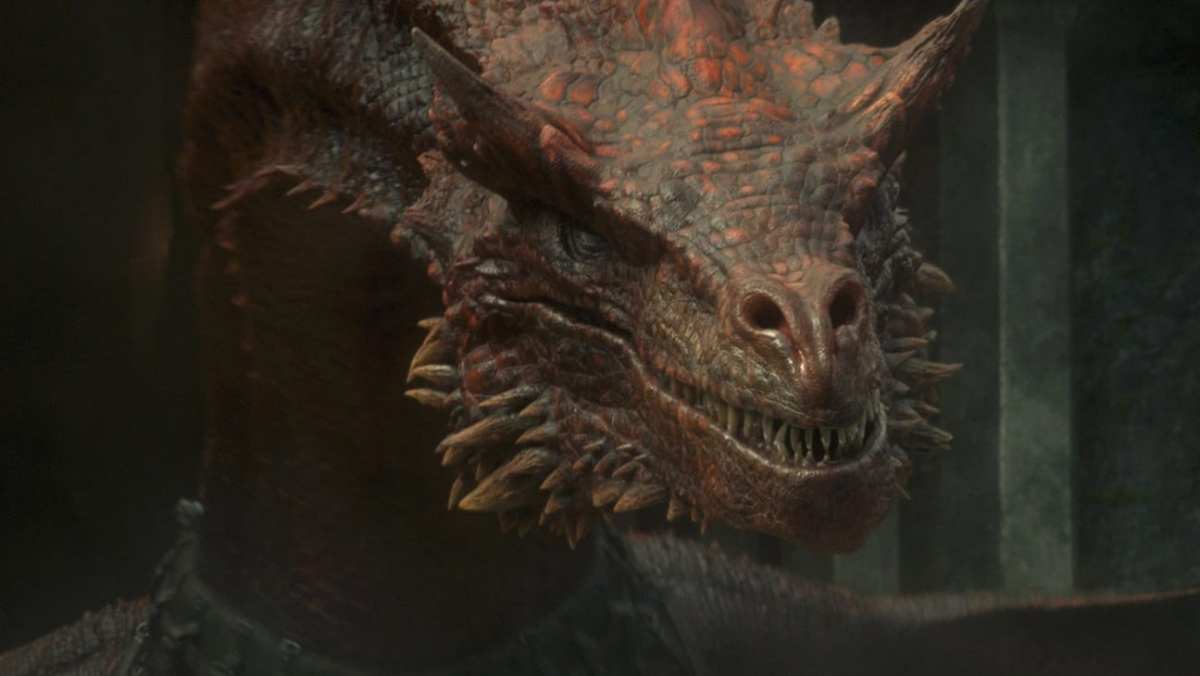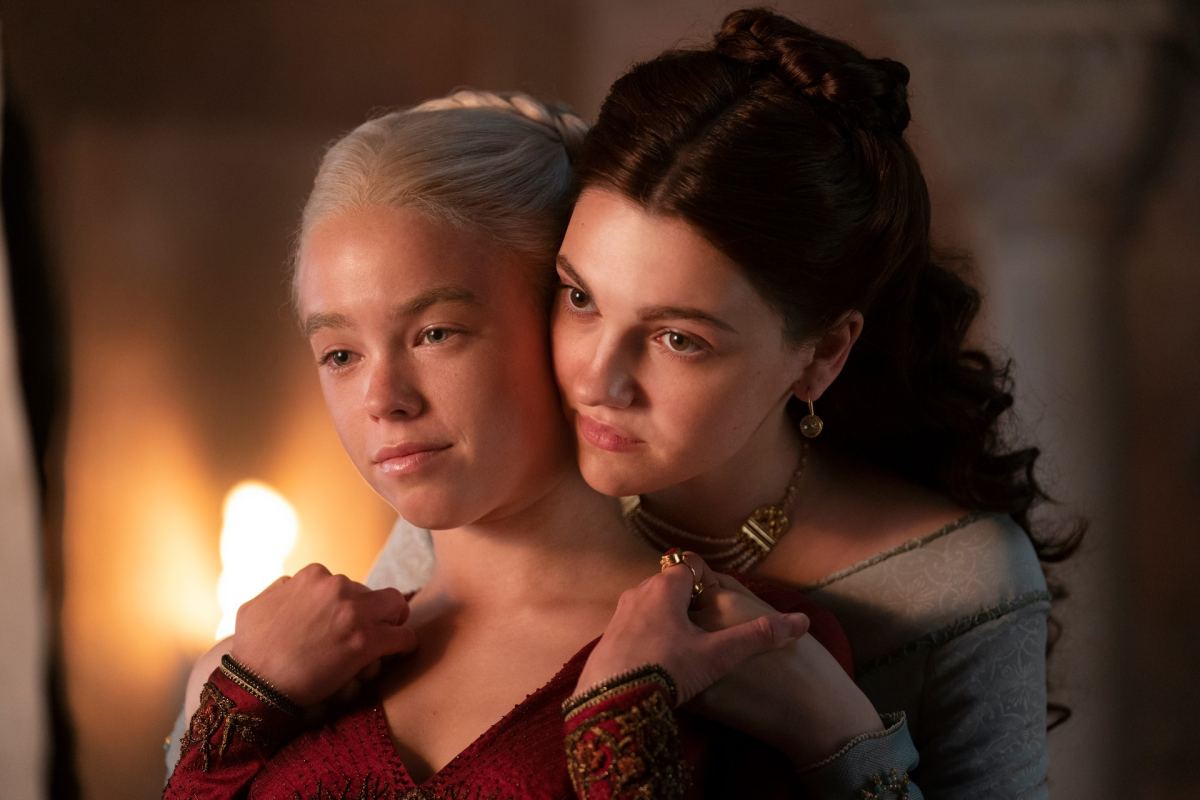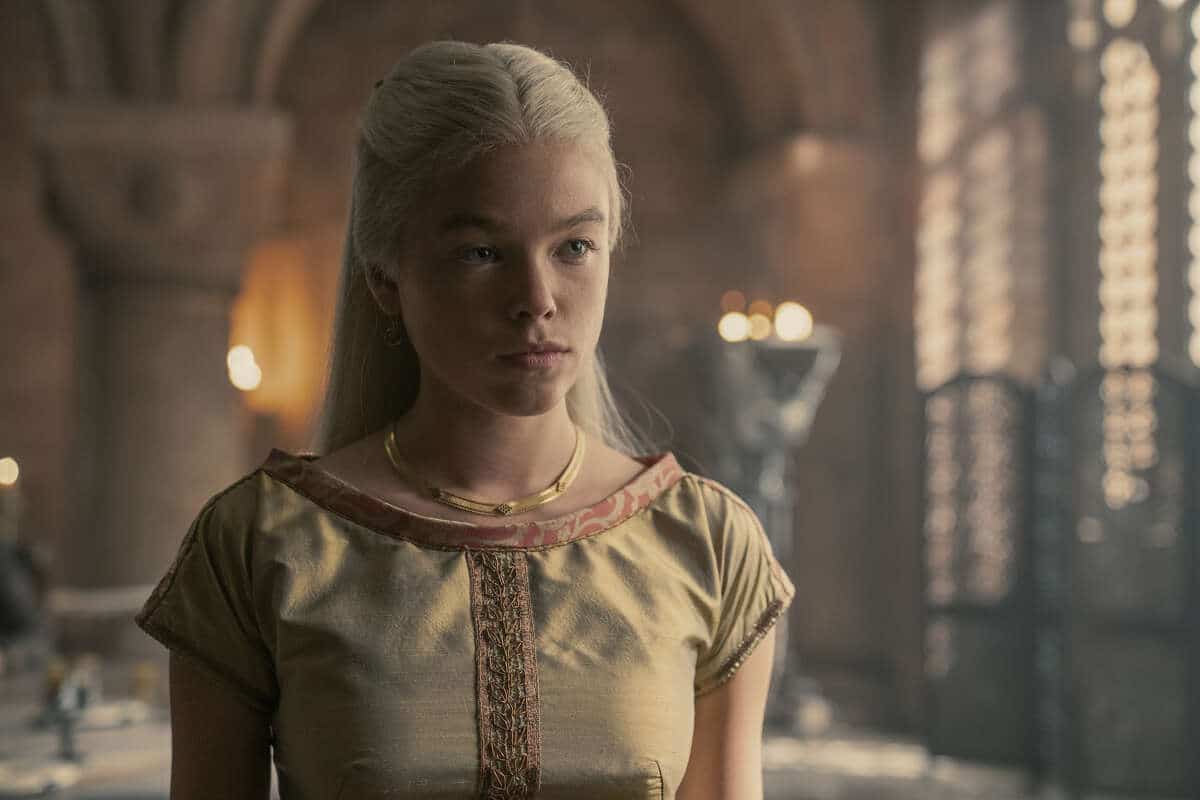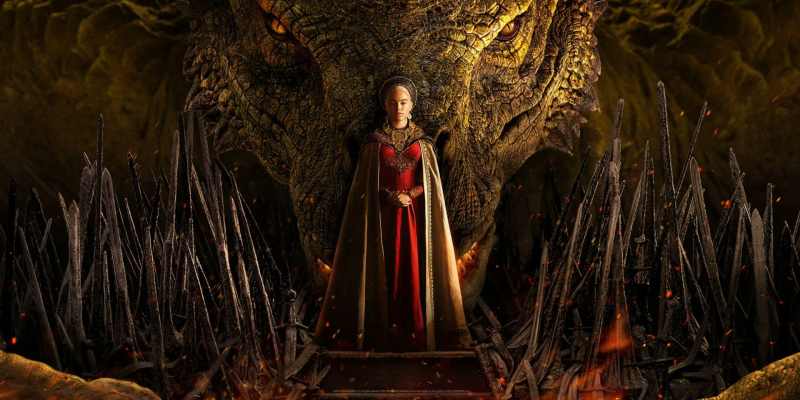This discussion and review contains spoilers for House of the Dragon episode 1, “The Heirs of the Dragon,” the HBO premiere.
Daenerys Targaryen (Emilia Clarke) casts a long shadow over House of the Dragon, and it is evident from the opening moments of “The Heirs of the Dragon.”
In the opening scenes, Rhaenyra Targaryen (Emma D’Arcy) recalls how her aunt, Rhaenys (Eve Best), was passed over for the Iron Throne by the Lords of Westeros, based on nothing more than her gender. “Rhaenys, a woman, would not inherit the Iron Throne,” Rhaenyra narrates, in a scene that is clearly meant to establish the original sin of House of the Dragon, the formative trauma that spurs the ensuing drama forward in the same way the opening White Walker attack did Game of Thrones.
In case the audience doesn’t get the subtext, the title card that immediately follows underscores the point, dating the story to “172 years before the death of the Mad King, Aerys, and the birth of his daughter, Princess Daenerys Targaryen.” However, much of that text fades away, leaving the audience with all that they need to know: “172 years before … Daenerys Targaryen.” Daenerys Targaryen is presented as a fixed point. She is the inevitable end of all of this, a culmination.
In case the point has yet to sink in, the title card is followed with another invocation of Daenerys Targaryen. The audience joins a younger version of Rhaenyra (Milly Alcock) as she glides and swoops through the sky on the back of her dragon, Syrax. In some ways, this feels like a brazen statement of purpose from the show, an assurance to the audience that House of the Dragon is operating on a larger budget than the earlier seasons of Game of Thrones. However, there’s more to it.

Rhaenyra is riding her dragon over King’s Landing, recalling Daenerys’ attack on the city in “The Bells,” towards the end of Game of Thrones. This parallel is reinforced in how director Miguel Sapochnik (who also directed “The Bells”) edits the sequence, cutting between shots of Rhaenyra in the sky and the view of the dragon from the streets below, as it swoops in low enough to unnerve the citizenry that have presumably spent hundreds of years in the shadow of such creatures.
This is a bold choice. “The Bells” is one of the most polarizing episodes of Game of Thrones. At Vulture, Sean T. Collins boldly ranked it the best episode that Game of Thrones ever produced, who also described it as “the most daring episode of Game of Thrones ever” in his Rolling Stone review. At The A.V. Club, Alex McLevy argued that it brought home the way that Game of Thrones would “twist the traditional narrative of swords and sorcery” into something subversive and horrifying.
For other critics, many of whom had positioned themselves as “Team Daenerys” heading into the endgame, “The Bells” was seen as a brutal betrayal of Daenerys as a character. At Vox, Alex Abad-Santos argued that the portrayal of Daenerys as a brutal conqueror was “the greatest fraud Game of Thrones has ever perpetrated.” At Forbes, Paul Tassi called it “a total betrayal.” At The Verge, Julia Alexander contended that “almost everyone responding to the show was angry.”
As such, it is a bold move for House of the Dragon to open so directly engaging with the legacy of Daenerys Targaryen, particularly since it is a prequel set more than a century prior to her birth. Then again, given that the character was so popular that parents were giving their newborns names like “Daenerys” and “Khaleesi,” it makes sense to foreground that reckoning. There is, to put it simply, no way around it. So, “The Heirs of the Dragon” steers straight into the storm.

Watching “The Heirs of the Dragon,” it is clear that everybody involved has thought long and hard about Game of Thrones. Like any good spinoff, House of the Dragon feels like a piece of work that is in direct conversation with what came before, engaging in analysis and introspection of both the work itself and the response to it. It feels appropriate that House of the Dragon premieres a week after another prequel, Better Call Saul, drew down the curtains on its own similar conversation.
House of the Dragon is a show that seems attuned to feminist critiques of Game of Thrones. To pick an obvious example, the production team has talked at length about their intention to tone down the levels of sexual violence depicted on screen, which feels like a direct response to one of the more persistent and enduring criticisms of Game of Thrones. Incidentally, this is evident in “The Heirs of the Dragon,” with its fairly graphic “dismemberment” of a male criminal, which feels like a balancing of accounts.
Some critics read Daenerys’ descent into madness as an explicitly gendered arc, the stereotype of the overly emotional woman who lost control when given power and so destroyed an entire city. At Time, Eliana Dockterman contended that Daenerys’ arc relied on “the laziest of sexist stereotypes about crazed, power-hungry women.” At The Hollywood Reporter, Maureen Ryan put it more bluntly, contending that the final season’s thesis amounted to the misogynistic argument: “Bitches are crazy.”
This criticism ignores larger narrative arcs. Daenerys was only doing what her father, Aerys II Targaryen (David Rintoul), had attempted years earlier. Daenerys’ paranoia was also driven (and justified) by poor political choices made by Jon Snow (Kit Harington) that undermined her leadership. The only truly heroic figures in that final season — Arya (Maisie Williams) and Sansa Stark (Sophie Turner) — were both women, while men like Tyrion (Peter Dinklage) were largely impotent.

With some emotional distance, it seems like viewers who had been treating the invasion of Westeros as a team sport were outraged at being made complicit in Daenerys’ carnage. Daenerys’ arc was a stark reminder that “the world and its inhabitants get shaped by the fickle emotions of the powerful” and that “there are no good kings and queens.” After all, for all her “girl power,” Margaret Thatcher was no less capable of brutalizing innocents at home or abroad.
This is perhaps something of a worry going into House of the Dragon, that the show might overcorrect from some of the more extreme criticisms of Daenerys, and in doing so turn Rhaenyra into a more conventional and pandering take on Daenerys as “girlboss,” what Judy Berman described as “Game of Thrones’ very own colonizer Khaleesi.” It’s obviously very early to grapple with this, but House of the Dragon has set an admirable challenge for itself that will be fun to watch play out.
That said, “The Heirs of the Dragon” shrewdly foregrounds issues of gender within House of the Dragon, centering it as a key theme for the show going forward. In pre-release press, the show was pitched as a story about how “the patriarchy would rather destroy itself than see a woman on the throne.” It is certainly a timely theme, and it demonstrates how House of the Dragon exists in a very direct conversation with what came before, updating it for the modern world.
“The Heirs of the Dragon” makes it clear that women hold little power in this fantasy landscape. Rhaenys can never be queen, and Rhaenyra will face an uphill battle to do so. Rhaenyra’s mother Aemma Arryn (Sian Brooke) explains that their role in court is largely biological, to produce male children. “This discomfort is how we serve the realm,” Aemma tells her daughter. There is no agency, no choice, no freedom. In Westeros, women are largely incubators.

Aemma rolls her eyes as her husband, Viserys Targaryen (Paddy Considine), talks about how his son will emerge with a crown. “Born wearing a crown,” she repeats. “Gods spare me. Birth is unpleasant enough as it is. This is the last time, Viserys.” There’s no small irony in that observation. Birth is a big recurring motif in House of the Dragon, with reporter James Hibberb boasting that “the first season does for giving birth what Game of Thrones did for weddings.”
“The Heirs of the Dragon” presents birth as an act of violence. Aemma’s labor is crosscut with the Tourney. Daemon Targaryen’s (Matt Smith) rise and fall is played against the birth of his brother’s son and true heir. “The Heirs of the Dragon” doesn’t shy away from the horror of it all, but it is the casual brutality that is most striking, as Viserys is offered the “impossible choice” to sacrifice his wife for his yet-to-be-born son. “I love you,” he assures Aemma, as his servants hold her down to cut her open. It’s interesting and reassuring to see that House of the Dragon is still unflinching in its portrayal of brutality against women in its setting but is also more considerate in its depictions.
It is inevitable that House of the Dragon will be compared to Game of Thrones. The show is astutely aware of it. Indeed, even the Tourney scenes in “The Heirs of the Dragon” seem to exist in large part to be compared to those from “Cripples, Bastards, and Broken Things” and “The Wolf and the Lion” in the first season of Game of Thrones, to reassure viewers that House of the Dragon both scratches the Game of Thrones itch and is starting at a much higher level of production.
Still, it’s in the show’s decision to grapple so directly and so firmly with the legacy of Daenerys Targaryen that House of the Dragon establishes itself as a show that has something meaningful to say beyond just furthering the line of Game of Thrones. In “The Heirs of the Dragon,” the show suggests that Game of Thrones in 2022 is a much different proposition than it was just three years earlier.
